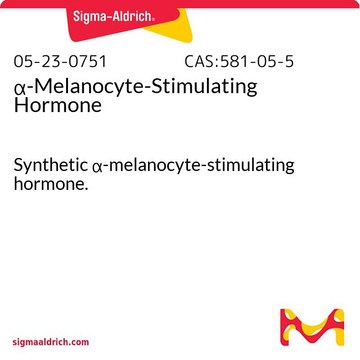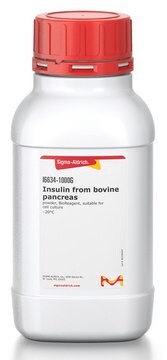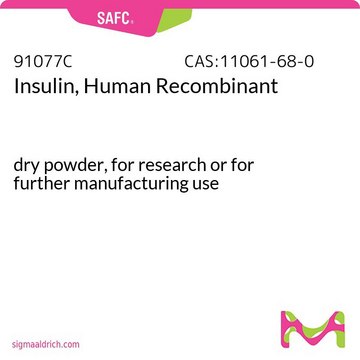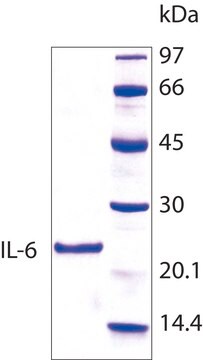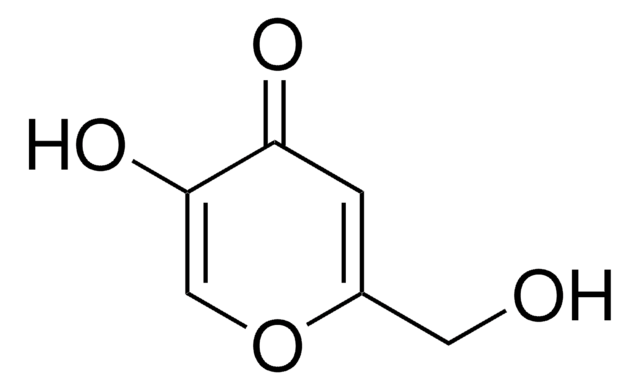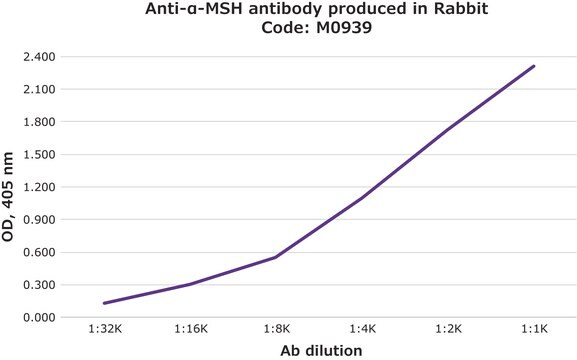Kluczowe dokumenty
M4135
α-Melanocyte stimulating hormone
≥97% (HPLC)
Synonim(y):
α-MSH, α-Melanotropin
About This Item
Polecane produkty
pochodzenie biologiczne
synthetic (organic)
Poziom jakości
sterylność
non-sterile
Próba
≥97% (HPLC)
Formularz
powder
rozpuszczalność
water: 1.00-1.04 mg/mL, clear, colorless
numer dostępu UniProt
Warunki transportu
ambient
temp. przechowywania
−20°C
ciąg SMILES
CSCC[C@H](NC(=O)[C@H](CO)NC(=O)[C@H](Cc1ccc(O)cc1)NC(=O)[C@H](CO)NC(C)=O)C(=O)N[C@@H](CCC(O)=O)C(=O)N[C@@H](Cc2c[nH]cn2)C(=O)N[C@@H](Cc3ccccc3)C(=O)N[C@@H](CCCNC(N)=N)C(=O)N[C@@H](Cc4c[nH]c5ccccc45)C(=O)NCC(=O)N[C@@H](CCCCN)C(=O)N6CCC[C@H]6C(=O)N[C@@H](C(C)C)C(N)=O
InChI
1S/C77H109N21O19S/c1-42(2)64(65(79)106)97-75(116)61-20-13-30-98(61)76(117)54(18-10-11-28-78)88-62(103)38-85-66(107)57(34-46-36-84-50-17-9-8-16-49(46)50)94-67(108)51(19-12-29-83-77(80)81)89-70(111)55(32-44-14-6-5-7-15-44)92-72(113)58(35-47-37-82-41-86-47)95-68(109)52(25-26-63(104)105)90-69(110)53(27-31-118-4)91-74(115)60(40-100)96-71(112)56(33-45-21-23-48(102)24-22-45)93-73(114)59(39-99)87-43(3)101/h5-9,14-17,21-24,36-37,41-42,51-61,64,84,99-100,102H,10-13,18-20,25-35,38-40,78H2,1-4H3,(H2,79,106)(H,82,86)(H,85,107)(H,87,101)(H,88,103)(H,89,111)(H,90,110)(H,91,115)(H,92,113)(H,93,114)(H,94,108)(H,95,109)(H,96,112)(H,97,116)(H,104,105)(H4,80,81,83)/t51-,52-,53-,54-,55-,56-,57-,58-,59-,60-,61-,64-/m0/s1
Klucz InChI
WHNFPRLDDSXQCL-UAZQEYIDSA-N
informacje o genach
human ... POMC(5443)
Szukasz podobnych produktów? Odwiedź Przewodnik dotyczący porównywania produktów
Amino Acid Sequence
Opis ogólny
Zastosowanie
- it has been Intracerebroventricularly (icv) injected to mice for behavioral studies.
- to determine the effect of α−MSH on growth of stationary Nb 2 node lymphoma cell cultures.
- to determine the effect of α−MSH on leptin secretion in the primary cultures of differentiated adipocytes.
- α−MSH promoted melanin production in the B16-F1 cells from murine melanoma cell line.
Działania biochem./fizjol.
Absorbent wiążący przeciwciała
Powiązanie
Inne uwagi
Kod klasy składowania
11 - Combustible Solids
Klasa zagrożenia wodnego (WGK)
WGK 3
Temperatura zapłonu (°F)
Not applicable
Temperatura zapłonu (°C)
Not applicable
Środki ochrony indywidualnej
Eyeshields, Gloves, type N95 (US)
Wybierz jedną z najnowszych wersji:
Masz już ten produkt?
Dokumenty związane z niedawno zakupionymi produktami zostały zamieszczone w Bibliotece dokumentów.
Klienci oglądali również te produkty
Nasz zespół naukowców ma doświadczenie we wszystkich obszarach badań, w tym w naukach przyrodniczych, materiałoznawstwie, syntezie chemicznej, chromatografii, analityce i wielu innych dziedzinach.
Skontaktuj się z zespołem ds. pomocy technicznej

